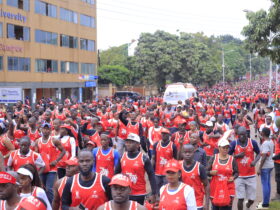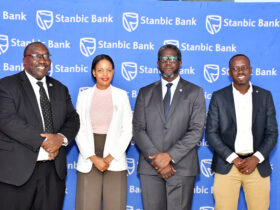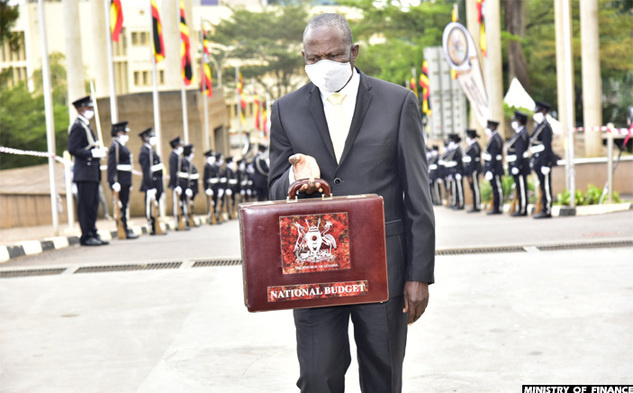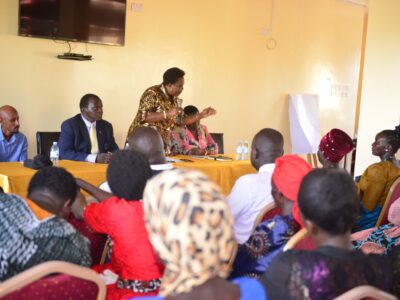In April, Parliament approved a Shs 45 trillion budget for FY 2020/21. Works and Transport takes the biggest share at Shs 5.8 trillion (13%) 2. Security Shs 4.5 trillion (10%) 3. Interest Payment Shs 4 trillion (9%) 4. Education Shs 3.6 trillion (8%) 5. Health Shs 2.7 trillion (6%).
Below is Finance Minister Matia Kasaija’s full speech;
Your Excellency, the Vice President
The Right Honourable Speaker of Parliament
The Right Honourable Deputy Speaker
His Lordship the Chief Justice
His Lordship the Deputy Chief Justice
The Right Honourable Prime Minister and Leader of Government Business
Right Honourable Deputy Prime Ministers
Madam Leader of the Opposition
Honorable Ministers and Members of Parliament
Members of the Diplomatic Corps
Distinguished Guests, Ladies and Gentlemen.
In accordance with Article 155(1) of the Constitution and Section 13(13) of the Public Finance Management Act 2015, the Revenue and Expenditure estimates for the Financial Year 2020/21 were approved by Parliament on 24th April 2020. This statement, therefore, summarizes the economic policy underlying the Budget estimates. It is with pleasure, that I deliver this speech on behalf of H.E. the President.
Introduction
Madam Speaker, today, we face unprecedented times. The global Corona Virus pandemic has, without exception, impacted lives and economic activity across the world. The pandemic has worsened the effects of climate change and the locust invasion that Uganda and the region had already been grappling with.
Uganda has been reasonably successful in dealing with these emergencies. Allow me to commend His Excellency the President for his visionary leadership in the fight against these natural disasters and emergencies.
Madam Speaker, these emergencies have adversely impacted the economy. The livelihoods of many Ugandans have been negatively affected with declining household incomes, and in some cases the loss of jobs and food insecurity. Economic activity has drastically declined, with reduced demand for agricultural produce, the disruption of input supplies to manufacturers, as well as a disruption of Micro, Small and Medium Enterprises (MSMEs) activities. Inflows of Foreign Direct Investment and remittances of Ugandans in the diaspora have also declined sharply.
Madam Speaker, the crises we have recently faced cannot, however, distract us from our long-term development strategy. These emergencies, indeed, present several lessons and opportunities that we have drawn on to craft the Economic Stimulus and Growth Strategy I will elaborate today. These opportunities include the following:-
The acceleration of our import substitution and export promotion strategy for a range of goods including medicines and other health products; and the products of agro-industrialization and light manufactures, which Uganda can produce with a comparative advantage;
Digitalization of many aspects of socio-economic activity to improve efficiency and reduce costs. This can be applied through e-Commerce; e-Government (including tele-conferencing, procurement and the dispensation of justice); e-Learning; robotic automation, artificial intelligence, cyber security and cloud computing; and digital marketing in tourism. This permits to fast-track implementation of the Fourth Industrial Revolution (4IR);
Strengthening contingency planning to mitigate the impact of disasters, and protect the most vulnerable persons;
Transforming Informality of doing business to being formal
Reform of Urban Transport to reduce congestion, starting with the Greater Kampala Metropolitan Area and eventually Regional Cities;
Domestic tourism stimulation to encourage many Ugandan residents to explore local touristic destinations.
Madam Speaker, we shall therefore seize these opportunities and continue on our path to developing an integrated, self-sustaining economy as laid out in the NRM Ten Point Programme. Uganda will also actively promote the development of African and global markets to enable access by Uganda entrepreneurs. The NRM Government shall therefore profitably add value to the range of agricultural products and minerals that Uganda is endowed with, as guided by H.E. the President in the State of Nation Address.
We shall build a strong and durable economy addressing the eight fundamental human needs namely; Food, Clothing, Shelter, Defence, Human Resource Development (Health and Education), infrastructure (electricity, roads, rail, ICT, Telecoms), and Spirituality. This will establish a firm basis for Service industries such as tourism, hospitality (hotels, bars, night clubs, casinos, etc) as well as entertainment (concerts, sports, etc) to flourish.
Madam Speaker, the budget has therefore been based on the following theme: ‘Stimulating the Economy to safeguard Livelihoods, Jobs, Businesses and Industrial Recovery.’
Madam Speaker, in my statement today, I will therefore do the following:-
Take stock of progress in Economic and Social Transformation that forms the foundation for Uganda’s resilience in the face of the emergencies we have faced and continue facing;
Present the Economic Stimulus and Growth Strategy; and
Present the financing framework underpinning the Economic Stimulus and Growth Strategy.
Progress In Economic and Social Transformation
Madam Speaker, the NRM Government has taken great strides to establish a strong foundation for economic and social transformation over the last five years during the implementation of the Second National Development Plan (NDPII). The strong foundation we see today has built the resilience we can see in the face of emergencies that we have recently faced. I will highlight some of the achievements we have registered in this regard, before spelling out the Economic Stimulus and Growth Strategy:-
National Output
Madam Speaker, the Uganda economy has continued to grow, despite the effects of the recent emergencies we have faced. Uganda’s GDP in the year 2019/20 is estimated to amount to U. Shs. 138 Trillion. The economy is estimated to grow by 3.1 percent this financial year ending 30th June 2020, slower than the average growth rate of 5.4 percent in the previous four years. Had it not been the emergencies we have faced in the last six months, the rate of economic growth would have been at least 6 percent per annum.
The Agriculture sector grew by 4.2 percent up from 3.8 percent in the previous four years. However, Industry grew by only 2.3 percent compared to an annual average of 7 percent in the previous four years. Services grew by 3.6 percent over the year compared to the annual average of 5.6 percent in the previous four years. These statistics demonstrate the effect of the recent emergencies that the country has faced. Despite the temporary shocks the medium term outlook for economic growth is positive and will be stronger given the measures we will implement.
Primary Production
Madam Speaker, substantial progress has been made in Primary Production. The Agriculture sector plays a central role in Uganda’s economy. It accounts for 45 percent of exports, and employs 64 percent of all Ugandans and 72 percent of all youths, thus its importance to influencing household incomes.
Primary production of commodities has increased significantly. Coffee production increased from 5.7 million 60-kg bags to 7 million bags between 2017 and 2019. Fish catches have grown from 391,000 Metric Tons to 561,000 Metric Tons between 2017 and 2019. This was largely as a result of the strict enforcement of fisheries regulations and addressing challenges of poor quality fingerlings and limited access to feeds. A total of 13,800 acres of sugar cane have also been established at the Atiak Sugar Factory in Northern Uganda and more is planned when the Amuru project starts.
Human Capital Development
Madam Speaker, the wellbeing of Ugandans has also improved significantly over the years. For instance:-
The literacy rate of Ugandans in 2018 increased to 74 percent of all adults compared to 72 percent in 2014;
Maternal mortality have reduced to 336 per 100,000 births from 438 per 100,000 births in 2011; and under-five child mortality has reduced to 64 per 1,000 births from 137 per 1,000 births in 2011
Access to safe water in rural areas today is at 69 percent increasing from 65 percent in 2015; with 38,500 villages representing 66 percent of the total 58,000 villages in the country having been provided clean water.
Access to safe water in urban areas stands at 79 percent, compared to 77 percent in 2015, with the piped water main network increasing from 17,600 Kilometres to 20,200 Kilometres. Over 66,000 new customers were connected during the year, bringing the total number of connections to over 720,000
Rural sanitation coverage is at 79 percent; while sanitation in urban areas increased to 87 per cent
Economic Infrastructure
Power: Madam Speaker, we continue to make long strides in developing Economic Infrastructure. Witness this:- Electricity generation capacity now stands at 1,254 Megawatts, with the completion of the 42 Mega Watt Agago-Achwa II, the 76 Mega Watt Kyambura and the 5.9 Mega Watt Ndugutu Power projects. The 183 Mega Watt Isimba Power Project and its transmission lines was commissioned and the 600 Mega Watt Karuma Power Project is 98 percent complete and is due for commissioning in November 2020. The Karuma – Kawanda Transmission Line is also 82 percent complete. Construction of Nyagak III Power Project also resumed in May 2019.
The electrification of industrial parks has also progressed with the commissioning of the Mukono and Iganga Industrial Parks sub-stations. Under the Rural Electrification programme, 14,820 kilometres of medium-voltage power lines and 10,280 kilometres of low voltage distribution power lines have been constructed. Since we launched the free Electricity Connections Policy in November 2018, 277,500 rural households have been connected with a target to connect 300,000 rural households annually.
Transport: Madam Speaker, transport infrastructure has improved considerably with the stock of the paved national road network today totalling 5,600 kilometres increasing from 4,300 Kilometres in 2015. The meter gauge railway network is under rehabilitation. The railway currently facilitates transportation of 18,000 tons of cargo monthly, and 2,000 passengers daily in order to support decongestion in Greater Kampala. In the air transport sector, thirteen (13) aerodromes have been rehabilitated countrywide and the expansion of the Entebbe International and the construction of the Kabale International Airports are progressing as scheduled. Uganda Airlines is revived and began operations during the month of August 2019.
Information and Communication Technology: Madam Speaker, ICT services have also performed well over the period. Internet users have increased from 7.5 million in 2016 to 11 million in March 2020. Total telephone subscriptions, of which mobile connections constitute 60 percent, increased from 21 million in 2016 to 28 million in January 2020. The value of Mobile money transactions increased from 3.4 Trillion in 2016 to 7.2 Trillion in March 2020.
The National Backbone Infrastructure now covers forty-nine (49) districts, 480 Ministries, Agencies and Local Governments, and 7 border posts. The monthly average unit cost of internet bandwidth for One Megabite per second (1Mbps) on the Backbone has reduced from $300 to US$70. The 500-seater ICT Innovation Hub at Nakawa was also completed during the year. Furthermore, one hundred seventy two (172) ICT Innovators were supported under the National ICT Initiatives Programme (NIISP) to develop e-Solutions. Some of their software applications have been used for business continuity during the Corona Virus lockdown.
Posta Uganda launched Community Information Centres in Kitgum, Kasese, Moroto and Mubende to enhance provision of information on government services and programs. Posta Uganda also successfully implemented the International Postal System (IPS) at Forty-eight 48 District Post Offices, enabling improvement in international and national operational efficiency in timely exchange of post.
Science, Technology and Innovation: Madam Speaker, in the Science, Technology and Innovation Sector, core projects have, too progressed well. For example, the Machining Manufacturing and Industrial Skills Training Centre (MMISTC) at Namanve was commissioned in January 2020. The centre will provide industrial skills training and apprenticeship, and manufacture high quality precision machine parts and accessories.
Madam Speaker, the first phase of the construction of the Kiira Vehicle Plant at the Jinja Industrial Park is 50 percent complete, and two (2) Kayoola Electric Buses have since been developed, assembled and tested under a Technology Transfer project with China High-Tech Corporation.
Governance
Madam Speaker, to improve urban security, Phase One of the Safe City CCTV project has been rolled out in Kampala Metropolitan, Wakiso, Mukono & Entebbe. Crime surveillance has also been enhanced with the deployment of LDUs across the country. The UPF also conducted Electronic Profiling of guns which will help to curb gun-related crimes. Consequently, crime levels reduced by 9.8% from 238,746 cases reported in 2018 to 215,224 cases in 2019.
Madam Speaker, to increase access to justice we have established One Stop Justice Law and Order Sector Centres, each consisting of a court, and Police services, the Directorate of Public Prosecutions (DPP), Prison Reception centres, Probation and Community Services, in 84 districts across the country. In addition, plea bargaining was instituted to decongest court and improve the court efficiency. Consequently, cases aged over 3 years old have reduced from 24% in 2017 to 17% in 2019.
Madam Speaker, to improve public service delivery, systems across Government have been developed and integrated as follows:-
the e-visa/works permits systems and the integrated Border Management System is now operational at 11 border posts and was extended to 17 Uganda Missions abroad that can issue visas to intending visitors. Consequently, average monthly visa applications have increased from 4,500 applications in 2016 to 12,700 applications in 2019;
electronic-passports have been integrated with the National Identification and Registration Agency (NIRA) register leading to a reduction in passport issuance from 10 working days in 2016 to 4 working days today;
business registration now takes four hours; and
Service Uganda Centres have been established at 18 Zonal Offices to eliminate bureaucracy and reduce cost of doing business.
Madam Speaker, the fundamental progress in the socio-economic transformation of Uganda that I have highlighted is a result of the NRM Government’s holistic development strategy. This socio-economic progress provides an underlying resilience to Uganda’s economy, which has enabled us withstand the temporary disruption of the Corona Virus pandemic, the locust invasion, and the effects of Climate Change.
Economic Stimulus and Growth Strategy
Madam Speaker, the Economic Stimulus and Growth Strategy that the NRM Government will implement commencing next financial year and in the medium term, is aimed at achieving the following three key objectives:-
Improving wellbeing of Ugandans;
Boosting economic transformation; and
Improving peace, security and good governance
Madam Speaker, these objectives address the three most critical aspects of Uganda society namely:- the peoples’ welfare, the viability of farms and businesses, and the social eco-system in which they exist and is a major determinant of their future prospects. I will now detail interventions in each of them in turn.
Improving Wellbeing of Ugandans
Madam Speaker, in pursuit of improving the wellbeing of Ugandans, Government has identified interventions that address their welfare, namely:- (i) Food Security and Good Nutrition (ii)Enhanced Healthcare provision (iii); Ensuring Universal access to Water and Sanitation; (iv) Increasing Social Protection for the most vulnerable population; and (v) Transforming Education Delivery. I will now detail the specific measures to be implemented in each area.
Food Security and Good Nutrition
Madam Speaker, the Corona Virus pandemic has brought to the fore the need to ensure adequate food security and nutrition. Food security and adequate nutrition is of paramount importance for a healthy and productive life and it is a major factor in healthcare as it reduces the burden of preventable diseases and malnutrition. It also contributes significantly to reduced maternal, neonatal, and child deaths.
Uganda is blessed with adequate rainfall and arable land which provides the necessary condition for agricultural production, adverse climatic conditions notwithstanding. The 14 products that have been identified by H.E. the President, will therefore be developed commercially. These products are maize, cassava, banana, beans, Irish potato, sweet potato, millet, sugar cane, cattle (beef), dairy, coffee, tea, cocoa and fish. To reduce post-harvest loses, the construction of storage facilities of 42,000 Metric Tonnes capacity that commenced in Iganga, Isingiro, Amuru, Kalungu, and Nebbi will continue.
Madam Speaker, in order to improve Nutrition, Government will aggressively implement programmes to ensure adequate sensitization and awareness of all Ugandans on the benefits out of good nutrition for their health and wellbeing. I would like to encourage all Ugandans to embrace healthy living through nutrition, wellness and active living. All Ugandans should place due emphasis on physical and mental activity by exercising regularly and making healthy choices of food, and by reading and writing.
Enhanced Healthcare provision
Madam Speaker, in order to promote health for all Ugandans, Government will strengthen health systems. In this regard, health spending has been increased to ensure the recruitment of additional health workers and also provide for their welfare.
In order to deal with the Corona Virus pandemic and other similar epidemics that may occur in the future, Government has prioritized the purchase of Personal Protective Equipment (PPE). Additional funding has been provided to increase Intensive Care beds at National and Regional Referral Hospitals. Funding has been availed to procure Corona Virus test kits and other materials in order to curb the spread of the virus and ensure readiness for possible secondary waves of infections, if they should occur. Government will enhance surveillance and decentralisation of management of the Corona Virus in the country. Government will also support scientific research and innovations especially in vaccine development.
Madam Speaker, further measures to strengthen health systems include the following:-
Undertake mass sensitization and awareness on immunization, the use of mosquito nets to prevent malaria, HIV/AIDS prevention and the prevention and management of Non-Communicable Diseases (NCD);
Develop Centres of Excellence for delivery of specialized medical care by completing the construction of the Uganda Heart Institute, establish centres for cancer treatment at Regional Referral Hospitals; and commission the Regional Hospital for Paediatric Surgery at Entebbe and fast-track construction of the International Specialised Hospital of Uganda at Lubowa;
Strengthen the supply chain for medicines and medical supplies to improve the availability of medicines and ensure accountability thereof. Many of these medicines will be manufactured in Uganda; and
Ensure Health Centres IIIs are functional with health workers, basic medical equipment, supplies and medicines. The total number of functional health centre IIIs is 1,327 and 41 health centre IIs are being upgraded to health centre IIIs next financial year.
Enhance access to Safe Water and Sanitation and Utilities
Madam Speaker, in order to ensure universal access to safe and clean water and improved sanitation, we will consolidate and build on achievements I reported earlier by undertaking the following interventions, details of which are in the Background to the Budget:-
Construct nine (9) Gravity Flow Schemes (GFS), Forty (40) solar powered Water Supply Systems; and drill four hundred and fifty-five (455) water wells;
Construct thirty (30) Water Supply and Sanitation Systems; develop Bulk Water Transfer Master Plans and Designs for fifteen (15) Water Supply and Sanitation Systems;
Construct twelve (12) small scale solar power irrigation schemes, twenty (20) parish-level and thirty (30) small scale irrigation schemes;
Intensify monitoring and forecasting of weather and water levels, floods and effectively disseminate information to guide policy actions by stakeholders; and
Enforce environment protection regulations for settlements on lake shores, riverbanks, wetlands, forests and flood prone areas.
Providing Emergency Social Protection
Madam Speaker, Uganda’s vulnerable population, including the elderly, require protection, more especially to address the aftermath of the recent emergencies. Government will therefore prioritise targeted support to the most vulnerable groups and those at higher risks of food insecurity, old age and the chronically ill. To this end we will: –
Continue to provide relief aid in response to the Corona Virus crisis, and natural disasters such as the locust invasion and climate change crisis – floods and landslides. This will allow the rehabilitation of adversely affected schools, health units, water points, and other social infrastructure and provide relief for vulnerable households affected. An allocation of U Shs 45 billion has been made towards this intervention; and
Roll out the Social Assistance Grant for the Elderly (SAGE) nationwide to persons aged 80 years and above, including the elderly aged 65 years in the piloted 15 districts. An allocation of UShs. 107 billion has been made for this intervention.
Transforming Education delivery
Madam Speaker, education plays a central role in the development of human capital. In order to improve the effectiveness in the delivery of education, Government will prioritise the following actions: –
Roll out the new education curriculum, including Early Childhood Development (ECD) curriculum;
Expand access to Vocational Education and Training, including international accreditation of Business, Technical, and Vocational Education and Training (BTVET) institutions as Centres of Excellence;
Improve the quality of tertiary education institutions by ensuring their adequate staffing and increasing the emphasis on academic research;
Enhance teaching supervision using digital platforms in the inspection of schools through scaling up the Integrated Inspection System; and
Develop the provision of lessons through digital platforms such as TV, Radios and the Internet to ensure continuous learning and implement the electronic delivery mode in validation and distribution of self-learning materials to learners.
Boosting Economic Transformation
Madam Speaker, in order to boost economic recovery and make progress with our Economic Transformation agenda, the Economic Stimulus and Growth Strategy we will implement shall(i) Restore Household Incomes and Safeguard Jobs (ii) Re-ignite Business Activity (iii) Provide Tax Relief to Businesses; (iv) Enhance Economic Infrastructure and (v) Improve Good Governance and Maintain Security Law and Order. The specific measures that Government will implement are the following:-
Restoring Household incomes and Safeguarding Jobs
Madam Speaker, following the immediate adverse impact on household incomes and jobs of the emergencies we have recently faced, interventions will be implemented to increase agricultural production to ensure national food security and expand regional food exports. This measure will also sustain the supply of inputs for agro-processing. The restoration of demand for agricultural produce is key to jumpstart this process. Safeguarding Jobs and other non-farm incomes is also critical for the restoration of demand for agricultural products. These actions ultimately ensure the recovery of aggregate demand for domestic products while booting incomes for the majority of households both rural and urban.
The specific actions that will be implemented in this regard are the following:-
Enhance the provision of improved agricultural inputs using NAADS e-Voucher Scheme to farmers and upscaling agriculture extension services to boost production of key agricultural commodities, for which an allocation of UShs. 300 billion has been made;
Create jobs for the vulnerable but able bodied persons affected by Corona Virus by expanding labour intensive public works in urban and peri-urban areas; for which an allocation of Ushs 130 billion has been made;
Provide rainwater harvesting technologies in rural communities, implementation of solar irrigation schemes and investment in the construction of multi-purpose water reservoirs
Roll-out regional and community based storage facilities to store increased agricultural products and reduce post-harvest losses; and
Provide seed capital to organised special interest groups under the Youth Fund, Women Entrepreneurship Fund and the ‘Emyooga’ Talent Support scheme; for which an allocation of UShs. 256 Billion has been made.
Re-Igniting Business Activity
Madam Speaker, Micro, Small and Medium enterprises (MSMEs) are the backbone of Uganda’s economy, representing an estimated 85 percent of private sector companies in regard to employment. The vast majority are operated by households and have also been extremely vulnerable to the recent emergencies, as they have low cash reserves and limited access to affordable investment finance. This also applies to other manufacturing firms that have been unduly affected by the Corona Virus crisis. Restoring their economic activity therefore enhances household incomes, especially in urban areas.
Madam Speaker, in order to improve the availability of investment finance and the cash-flows of Micro, Small and Medium Enterprises and other manufacturing firms, we will implement the following measures: –
Provide credit through SACCOs and Micro Finance Institutions to support micro and small-scale enterprises. I am proposing an allocation of UShs 94 billion for FY2020/21;
Increase access to credit at Uganda Development Bank to offer low interest financing to manufacturing, agribusiness and other private sector firms, for which I have provided UShs. 1,045 billion over the medium term;
Increase funding to Uganda Development Corporation for public-private partnership investments to facilitate our import substitution and export promotion strategy, for which I have provided, to start with, UShs. 138 billion;
Provide for Banks to restructure loans to their borrowers who are facing liquidity constraints and provide additional liquidity on a case by case basis, as recently guided by the Bank of Uganda;
Reduce charges on mobile banking and mobile money transactions, to improve efficiency, reduce person-to person contact to prevent spread of the Corona Virus; and finally
Expedite the payment of arrears owed by Government to private sector firms commencing July 2020, for which I have provided UShs 673 billion in order to address liquidity constraints faced by suppliers of Government. Priority will be given to Small and Medium Enterprises, cooperative societies and contractors.
Tax Relief to Businesses
Madam Speaker, in order to further address the short term emergency liquidity requirements of businesses, boost their cash-flows, and ensure business continuity, I propose the following tax relief measures, which I will in due course present to Parliament:-
Defer payment of Corporate Income Tax or Presumptive tax for Corporations and Small, Medium Enterprises (SMEs). I am deferring until September 2020, the payment of any Corporate Income Tax and Presumptive Tax due 1st April 2020 to 30th June 2020, for tax complaint businesses with a turnover of less than Shs 500 million per annum.
Furthermore, no interest or penalties will accumulate on these amounts during this period. This is aimed to benefit companies and Small or Medium Enterprises (SMEs) especially in tourism, manufacturing, horticulture and floriculture. The number of taxpayers benefiting from this measure for whom Corporate Incomes Tax is applicable is 10,140 and the deferred tax is estimated to be Ushs 12.5 billion. In addition, the number of tax payers benefiting from the presumptive tax measure is 23,892, and the deferred tax is estimated to be Ushs 1.38 billion.
Defer payment of PAYE by sectors affected: I am deferring payment until September 2020 of PAYE due from 1st April 2020 to 30th June 2020 for tax compliant Ugandan businesses facing hardships as a result of the COVID-19 pandemic. No interest will accumulate on tax due during this period. An estimated UShs 65.35 billion due from Pay As You Earn (PAYE) for manufacturing and tourism sectors is being deferred. For floriculture sector, the expected PAYE deferral is Ushs 0.237 billion.
Waive interest on tax arrears: I am waiving interest and penalties on tax arrears accumulated before 1st July 2020 to lessen the tax liability of businesses who voluntarily comply with their tax obligations. The expected tax relief as a result is Ushs 50 billion.
Provide for Tax Deductibility of Donations for the Corona Virus Response. I am allowing the value of the donations the private sector has made towards the Corona Virus Response.
Expedite Payment of outstanding VAT refunds: The Uganda Revenue Authority will speed up payment of outstanding VAT refunds due to businesses accompanied by measures to limit fraud. An additional Ushs 120.53 billion will be refunded.
Financial Sector Stability
Madam Speaker, in order to ensure financial sector stability in support of the economy, I reiterate the Bank of Uganda pronouncements on measures being implemented to mitigate risks to overall economic growth, and also ultimately support the financing of businesses:-
Providing for adequate capital buffers for supervised financial institutions to ensure effective operation by deferring payments of all discretionary dividends and bonus payments for at least 90 days effective March 24, 2020. This preserves the capital of a financial institution and is intended to support the real economy;
Smoothening out volatility in the foreign exchange market arising from global financial markets;
Providing exceptional liquidity assistance for a period of up to one year to Supervised Financial Institutions that may need it;
Waiving limitations on restructuring of credit facilities. Supervised Financial Institutions (SFIs) have been permitted to restructure loans and provide loan repayment holidays to companies and individuals affected by the Corona Virus pandemic; and
Encouraging the reduction of Mobile Money and other digital Transactions fees that are charged by Mobile Network Operators and commercial banks, in order to limit the use of cash and customer visits to banks.
Enhance economic infrastructure
Madam Speaker, economic infrastructure covering roads, rail, water, irrigation and air transport remains key to economic recovery and boosting economic transformation. The interventions that will be implemented to enhance economic infrastructure include the following:-
Undertaking emergency maintenance across the country of Roads and Bridges infrastructure following the destruction caused by floods;
Developing warehousing capacity at community, district and regional hubs across the country to restoring supply chains and promote exports;
Expediting construction of priority industrial parks and special economic zones;
Rehabilitating the Meter Gauge Railway, improving water transport safety by installing navigation aids and development of air cargo infrastructure, including the completion of the new cargo facility at the Entebbe International Airport; and
Expanding feeder and national road network, power, and Information and Communication Technology (ICT) infrastructure.
Improving Peace, Security and Good Governance
Madam Speaker, Government will continue to improve peace and security, the rule of law and good governance. As we have done before, good governance will be enhanced to provide the necessary conducive environment to facilitate all aspects of societal development. The specific measures address (i) the promotion of peace and security at the community and national level; (ii) enhancing effectiveness in public service delivery; and (iii) increasing access to justice.
Peace and Security
Madam Speaker, in order to promote peace and security of persons and property at the community level, we will implement the following measures:
Intensify community vigilance by strengthening the Local Council system, promote community policing in coordination with Local Defence Units (LDUs);
Complete the rollout of the Safe City CCTV project in Jinja, Lugazi, Kayunga, Njeru, Gulu and Masaka and ensure its effective utilization in monitoring crime and responding to distress calls;
Improve border control through phased implementation of border point automation, in order to control illegal entry, improve compliance with immigration laws and regulations, and ensure national security;
strengthen the capacity of internal security; and
Fast track implementation of the convict transitional policy to integrate former convicts back into their communities.
Madam Speaker, in order to ensure the defence of the country, Government will further strengthen the capability of the Uganda Peoples’ Defence Forces, and enhance the effectiveness of the Intelligence apparatus.
Access to Justice
Madam Speaker, to improve access to Justice, the following interventions will be undertaken:-
Construct an additional 5 one-stop Justice Law and Order Service Centres across the country;
Implement the electronic case management system in the Judiciary to increase efficiency in case management;
De-concentrate services for Government Analytical laboratories and business registration services to regional centers in Arua, Fort Portal, Gulu, Mbale, Mbarara and Moroto;
Build capacity of Local Council courts in adjudication in order to decongest courts of petty cases and increase access to justice. To date 38,000 Local Council Court officials have been trained and a further 78,000 are targeted for training in 2020/21;and
Eliminate case backlog by implementing the case backlog reduction strategy, including the use of non-custodial sentences including Community Service to reduce remand population.
Madam Speaker, Parliament recently enacted into law the Administration of the Judiciary Bill 2018 which comprehensively provides for the functioning, operation and administrative independence of the Judiciary. Construction of the Supreme Court and the Court of Appeal has commenced and will eventually address housing of these important appellant courts of law. We therefore look forward for enhanced performance of the Judiciary.
Public Service Delivery
Madam Speaker, to achieve better public service delivery, the following actions will be undertaken: –
Integrate systems and implement one-stop Service Uganda centres to allow the public to access related services in a single location. The Service Uganda centres will be rolled out to 18 zonal offices across the country.
Develop the Public Investment Management Systems (PIMS) policy to strengthen Sector coordination in Project identification, preparation, implementation and ex-post evaluation; define roles and responsibilities of Project stakeholders, enhance project management and institute a culture of maintenance of public assets;
Implement e-Government procurement across all Ministries, Departments, Agencies and Local Governments, and monitor government contracts and procurement in partnership with non-state actors in order to improve efficiency, eliminate corruption in procurement and reduce cost of doing business;
Enhance tele-conferencing facilities in government to limit person to person contacts in addition to reducing on operational costs in terms of travel expenses; and
Fully implement the Leadership Code Act including the operationalization of the Leadership Code Tribunal to ensure that the Leadership Code of Conduct is effectively enforced among all Leaders and Public officers.
Madam Speaker, in order to address the challenge of corruption, the following measures will be undertaken:-
enhance the efficiency and effectiveness of oversight and anti-corruption institutions in identifying areas of risk;
strengthen implementation and follow-up on audit recommendations;
strengthen implementation of Public Finance Management rules and regulations and the role of Internal Audit; and
enhance capacity of the Financial Intelligence Authority and related security agencies to intensify surveillance and gather of vital information to curb Anti-money laundering and terrorism financing.
Financing Framework
Madam Speaker, Government is developing an Integrated Financing Strategy to guide and monitor how we appropriately raise domestic revenues, and both domestic and external debt financing over the NDP III period. This strategy lays out how Government shall approprately raise financing to meet its development goals, in both the short and medium term. It will also ensure that Government only borrows at most favourable financing terms for projects that will provide a socio-economic growth dividend.
Madam Speaker, the with respect to the Financing Framework that underpins the Economic Stimulus and Growth Strategy I have elaborated, it specifically balances the need to restore economic activity, on the one hand, while raising adequate revenues to finance government expenditures. The sources for funding include domestic revenues and public debt financing.
Domestic Revenues
Madam Speaker, domestic revenue measures for next financial year are anchored on the Domestic Revenue Mobilization Strategy (DRMS), which aims to mobilise sufficient revenue to support infrastructure development and social welfare. The Strategy balances competing challenges of increasing the revenue effort to support expenditure needs, while at the same time facilitating investment and industrialisation. The Strategy seeks to enhance revenue collection to finance the larger part of our Budget in the short, medium and long term and to create a tax system that is fair and transparent.
Madam Speaker, in view of the recent emergencies we have faced, Government introduced modest adjustments in some taxes to raise revenue. This will support enhanced economic recovery, as well as maintain an acceptable level of social welfare. Tax administration will be strengthened to improve efficiency in revenue collection. The capacity of local governments, including the roll out of the digital collection of fees and rates, will also be enhanced to improve local revenue generation.
Madam Speaker, next financial year’s revenue target is UGX 21,810 billion, comprised of tax revenue amounting to UGX 20,219 billion and non-tax revenue of UGX 1,591 billion. This target translates into a revenue effort of 14.3 percent of GDP. To achieve this target, we will implement the following new interventions: –
Further roll out use of digital tax stamps and expand the range of products covered in order to deter under-declaration of production and importation. Digital stamps also ensure that goods on the market meet the required health and safety standards;
Widen the scope of the income tax withholding agents across all sectors in order to broaden the tax base;
Enhance rental income tax collection and compliance by implementing a digital collection solution, as well as gazette rental income tax chargeable in different geographical areas for taxpayers who do not voluntarily declare their rental income;
Gazette VAT withholding agents with an applicable VAT rate of 6 percent, and provide for penalties for failure to withhold; and
Rollout the use of Electronic Fiscal Devices (EFDs), which are – cash registers interconnected to the Uganda Revenue Authority, to improve record keeping and tax compliance.
Madam Speaker, the modest adjustments to tax rates that have been made include the excise duty rate on fuel; and adjustments to improve competitiveness in the region, support compliance, remove ambiguities in the legislations as well as close loopholes that may lead to revenue leakage. In order to promote import substitution and the development of local industries, we have increased import duties on goods that are produced or can be produced locally. The import duty on agricultural products has been increased to 60 percent and other products to 35 percent.
Hitherto, we have been importing refined industrial sugar yet we are a surplus producer of sugar. We have agreed with sugar manufacturers to produce refined industrial sugar locally and we shall protect them from imports.
Madam Speaker, in order to support agriculture, VAT on the supply of agricultural equipment will be exempted. The supply of processed milk will also be VAT exempt to enhance the price competitiveness of milk produced in Uganda. In order to respond effectively to the covid-19 pandemic, taxes on supplies for diagnosis, prevention, treatment, and management of the epidemics, pandemics and health hazards, will be exempt from customs duties.
Public Debt Financing
Madam Speaker, total public debt as at December 2019 amounted to United States Dollars 13.3 Billion, with external debt accounting for United States Dollars 8.59 Billion or 64.4 percent while domestic debt amounted to United States Dollars 4.74 Billion or 35.6 percent of total debt stock.
Madam Speaker, Government’s approach to public debt financing is elaborated in the Medium Term Debt Strategy for the five- year period commencing next financial year. The Strategy seeks to contract only affordable external debt in preference to domestic debt. The approach to reduce domestic debt in preference to external debt is intended to lower the cost of interest payments to 2.2 percent of GDP compared to 2.6 percent of GDP, if we were to continue borrowing signficantly from domestic sources.
Madam Speaker, to ensure that public debt remains sustainable, we will implement the Domestic Revenue Mobilization Strategy to increase Government’s capacity to finance programs with less reliance on domestic and external borrowing. In response to the Corona Virus crisis, Government has commenced negotiations with some creditors for debt relief. This will free resources to finance interventions in the fight against the pandemic.
Resource Envelope and Allocations for Financial Year 2020/21
Madam Speaker, the Resource Envelope of Financial year 2020/21 totals Shs.45,493.7 Billion of which Domestic Resources amount to Shs. 25,585.6 Billion. Domestic Financing amounts to Shs 3,560.3 Billion; while External Financing consists of Project Support of Shs. 9,515.3 Billion and General Budget Support Shs. 2,906.7 Billion. Domestic re-financing amounts to Shs. 7,486.1 Billion and Appropriation in Aid is Shs. 215.6 Billion.
Madam Speaker, total Expenditure amounts to UShs. 37,792 Billion of which Recurrent Expenditure is UShs. 19,787.8 billion and Development Expenditure is UShs. 18,004.2 Billion. Sector allocations can be found in the Budget as approved by Parliament.
Conclusion
Madam Speaker, Uganda’s economic outlook is positive. The Corona Virus pandemic has helped us to once again demonstrate the economic capacity and the vast opportunities that our country has. The budget for Financial Year 2020/21 will support the economy to fully recover, harness the potential that we have, and get back to our progressive journey of double digit GDP growth rate.
The focus of the budget for next financial year places emphasis on supporting livelihoods and the recovery of business enterprises, without losing focus on our long-term development initiatives. To this end, the Government will support the private sector to scale up production, sustain and increase employment.
I call upon Ugandans to ensure they keep safe by particularly following the directives from His Excellency the President and Ministry of Health regarding CoVID-19. The challenge of CoVID-19 will go, and the economy will pick up once again even at a much higher speed. I therefore implore all Ugandans to be part of this journey and, in the end, enjoy the fruits of our common efforts.
Madam Speaker, the recent emergencies, especially the Corona Virus pandemic have necessitated additional interventions and resource allocations after the Budget was approved. We have since been undertaking extensive consultations with several stakeholders, including civil society and the private sector, on remedial actions. Consequently, the budgets of all Ministries, Agencies and Local Governments will be revised to align them with the nine (9) strategic priorities and 14 production lines articulated by His Excellency, the President. This will focus the budget on production and not consumption. I will accordingly return to Parliament for the necessary approval.
I beg to submit.
For God and My Country.












